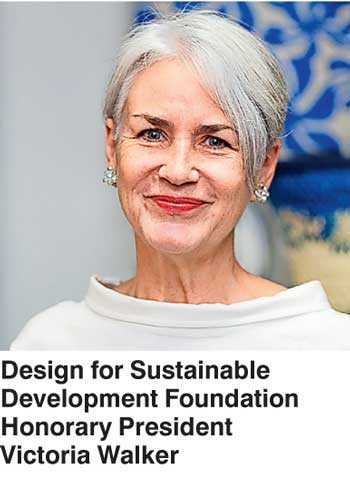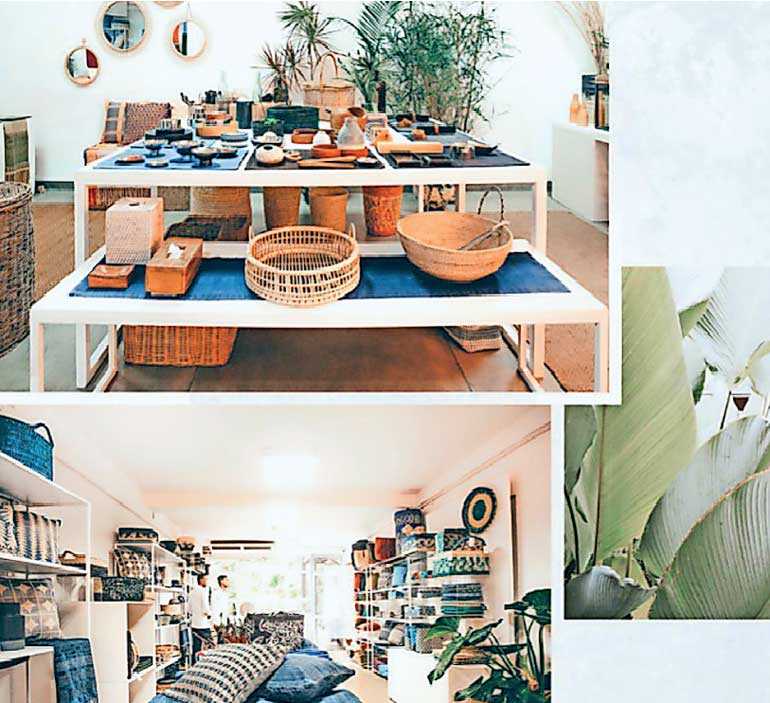Tuesday Feb 17, 2026
Tuesday Feb 17, 2026
Friday, 10 August 2018 00:10 - - {{hitsCtrl.values.hits}}
 When the Design for Sustainable Development Foundation was launched few years ago, the big idea was to facilitate designers and artisans to collaborate with one another to create contemporary craft products, and create a network of retailers, buyers, brands and businesses that valued and purchased them. It was about putting design at the service of people and towards the development of their economies.
When the Design for Sustainable Development Foundation was launched few years ago, the big idea was to facilitate designers and artisans to collaborate with one another to create contemporary craft products, and create a network of retailers, buyers, brands and businesses that valued and purchased them. It was about putting design at the service of people and towards the development of their economies.
Today, the foundation works with over a thousand artisans across Sri Lanka, close to 50 designers from both local and international backgrounds, and a growing network of clients. This includes the hospitality and tourism industries, individual retailers, and brands. DFSD has also inspired brands like Island Craft and Fashionmarket.lk to present contemporary craft based collections of fashion, homeware and lifestyle products utilising the DFSD foundation as its base. With all this success in the local market at its hand, DFSD is now ready for the next stage, extending beyond home shores. Signifying this major move, DFSD recently announced its new honorary president – Victoria Walker.
Walker who is, very fittingly, an international relations expert with over 25 years’ experience, who harbours a lifelong passion for traditional craft and textile arts from around the world. She is bringing the expertise she garnered from postings in Laos, Canada, India, and as Australian Consul General to Chicago, and from her work in areas of sustainable development, women’s rights and international environmental agreements. Discussing this new role, what excites her about it and what she envisions for DFSD’s future as it begins to evolve beyond Sri Lanka, Victoria Walker joined in for this interview.
We started by asking her where it all begun. Like for many, for Victoria, it was in finding something she that truly believed in. “For some time now, I’ve been working with the parent company of DFSD ‘Design Corp’ as I love the quality of the handcrafted textiles and craft that they produce. I was aware this quality was the result of a unique and respectful collaboration between designers from AOD – Colombo’s premier design institute, and talented rural artisans from around the island. This contemporary design-meets-traditional expertise is a model that I truly believed in. So, I was delighted to take on this role with DFSD Foundation, and to lead this important work of helping to take Sri Lankan craft to a new level.”
Furthermore, Victoria also closely resonated with the foundation’s work in helping artisans find new markets, empowering women, and preserving heritage craft. “All these objectives struck a chord with me – as I think they do for the many people who love beautiful craft and textiles and who want to support the extraordinary skill of traditional artisans,” she adds thoughtfully.
Speaking more about the DFSD vision – ‘making a difference through design’, Victoria discussed why she took on to the idea of converging design with craft so keenly. “I’m a firm believer in the important role of great design in fostering an innovative society. Great design is not only about end product – of course, it should be beautiful, functional and fit for purpose – but, it is also about how we look at problems and come up with solutions. Design thinking embraces diversity and different ways of working; and, DFSD truly lives this philosophy.”
Amidst all this, Victoria also found DFSD that meant another great thing to her, even at a more personal level – this is an opportunity to follow her life’s interest in handcrafted textiles and craft. For years, Victoria had collected fascinating traditional textile from cultures throughout Asia. In Sri Lanka too, she has been amazed by the artistry and skill of traditional artisans.
“Creative expression is rich and unique here, and it’s evident in its textile and craft traditions. I’m also very serious about being a responsible and ethical consumer. I care that the artisans who make my textiles and craft are treated respectful and paid properly, and that the craft is produced in an environmentally responsible manner. DFSD, and everyone involved in it, shares this passion for ethical and responsible behaviour,” she adds, opening up another dimension where she resonates so well with the DFSD foundation philosophies.
Victoria does not agree with the outdated idea of giving artisans ‘charity work’ which is devoid of commercial relevance, education and exposure that lead to true and sustainable empowerment. “Skilled artisans in SL do not need charity. They have amazing talent, wonderful raw material, skills. What they do need is help to connect with customers and to secure stable markets. Great design is part of this. Take our Palmyra weavers in the North as example; working with our designers, these artisans were able to raise the quality of their products to such an extent, that now they can sell to the international market. It’s a win for everyone.”
Victoria sees this process as an important step to preserve not only the artisan communities, but also an important cultural element by sustaining craft heritages. “Too many of our crafts are being lost through the lack of good product development, training or market linkages. DFSD foundation’s work aims at trying to fill some of these gaps.”
Victoria also shared her thoughts on another core element of the DSFD Foundation vision. This is, facilitating female empowerment through its work and operations. “Full participation of women and men is necessary to achieve our full potential as an organisation and a society. This is where ensuring women have an equal voice in matters that affect them is not just right, but also a smart strategy. With DFSD, many of the artisans that have been supported by us so far, have been women – primarily in the war-affected areas the North and North-east. A great majority of them are the income earners for their families, and have had additional hurdles in their quest to make a dignified living. DSFD works respectfully and closely with these women and provides them with a safe and supportive environment to develop that voice, act on behalf of their family and community and develop their skills to a new level. We have seen the difference that this support can make and are committed to staying the course,” she says.
Victoria is also an advocate of environmental consciousness and sustainability, which DFSD also keeps central to its work. By constantly employing and improving methods and materials conducive to nature and demand less energy, DFSD approaches sustainable development quite openly and understanding that it is not a one-size-fits-all solution. As Victoria calls it, “it is about stepping gently on the environment and protecting it for future generations.”
The future – this is something that Victoria seems to be immensely passionate about. At DFSD, this attitude will translate to developing creative partnerships, promoting new collaborations and, pooling knowledge and expertise. “I want to tell the world about Sri Lanka’s extraordinary craft heritage and how important that it is recognised, cherished and supported. Things like the beautiful and complex Dumbara weaving technique that is indigenous to Sri Lanka, with only a few remaining practitioners...these stories need to be heard.”
She concludes the interview, inviting pen discussion, conversations and collaborations.
To connect with DFSD Foundation and its new Honorary President Victoria Walker, reach AOD on 0115867772 or [email protected].
